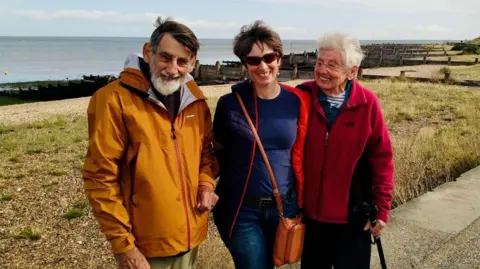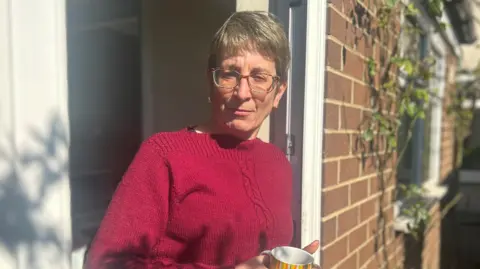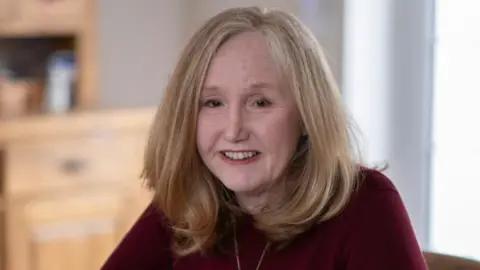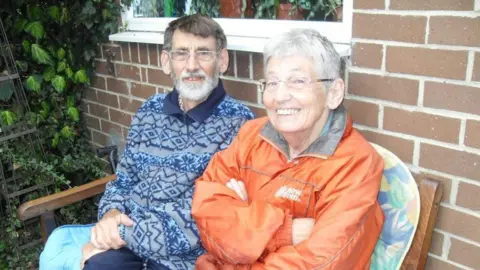'I slowly realised I was running two households'
 Christine Bell
Christine BellAs retirement age rises for many people, more grown-up children than ever are providing their parents with the support they need to go on living independently, while also continuing to work full time themselves. Christine Bell is one of these so-called "carents".
Christine is preparing to take her 95-year-old father Colin to a routine hospital appointment.
But, for Christine, who lives in Guiseley, Leeds, that means a 400-mile round trip and two days away from running her own business as her father lives in London.
It is a train journey she has made many times in the last 15 years.
Her late mum, Beryl, once broke her knee in a fall and, in order for her to stay at home, Christine and her sister decided to divide up her care between them.
"Slowly, I realised I was running two households," Christine says.
"I was doing all their bills; I had more contact with their GP than mine."
As Beryl's health deteriorated and Christine tried to manage her mother's palliative care long-distance alongside managing her own life, she says she eventually reached breaking point.
Becoming emotional, Christine explains: "There were times I just wanted my mum to die because she was suffering."

Having packed for her latest trip to the South, Christine takes one train into Leeds city centre and then another one to London, before finally getting the tube to her father's house.
By the time she returns to Leeds, she will have been travelling for more than nine hours, all so she can accompany her father to a 10-minute appointment at a nearby pacemaker clinic.
Christine says she has been lucky to have a "really loving" relationship with her parents, but at times she has found it overwhelming trying to support them to stay at home alongside continuing her own work.
According to Dr Jackie Gray, Christine is far from alone.
Dr Gray, a retired GP and public health consultant based in Northumberland, says she has watched the role adult children play in ageing parents' lives change "dramatically" over the course of her career.
She explains that when she first qualified, it was rare to see people living past 75.
"But, medical advancements, people living and working longer, as well as living further away from their parents, has caused a kind of perfect storm - a societal shift," she says.
In 2020, after seeing increasing numbers of patients - usually women, she says - struggle with caring for their parents, Dr Gray launched the Carents Room website, offering forums and information.
 The Carents Room
The Carents RoomDr Gray says "nobody really knows" how many "carents" there are, but a 2023 King's Fund report suggested that about 57% of unpaid carers were looking after a parent or grandparent.
That means there could be up to four million people in this position in England alone, she says.
A recent Carents Room survey of at least 1,000 members found more than half provided about 20 hours of care a week.
Meanwhile, 70% said they had reduced their working hours or left work altogether so they could care for their relatives.
According to Dr Gray, family relationships can be complex and older people can find the idea of their children as carers upsetting - as can the grown-up children themselves.
Relationships with siblings can also be fraught, she says.
Plus, Dr Gray points out that "carents" can often struggle with what she calls a sense of "anticipatory grief".
All of this means the support group she set up has seen a rise in people seeking help.
"We have a signed-up community of about 40,000 people, and that is growing by almost 100 people a day," she says.
Common themes, including struggling with "life admin", appointments, travel, and balancing work commitments all emerge from the online forums and focus groups, Dr Gray explains.
'Practical solutions'
According to the Office of National Statistics (ONS), there were an estimated 1.4 million so-called "sandwich" carers - people who provide care for sick, disabled, or older adult relatives as well as for dependent children - in the UK between 2021 and 2023.
The ONS found that 61% of "sandwich" carers were female.
It also found that in England, the North East had the highest proportion of unpaid carers, at 10.1%, compared to other regions, as well as the highest proportion of people providing 50 or more hours of care.
Meanwhile, according to figures compiled by Carers UK, in England and Wales, unpaid carers provided care worth £183bn in 2021-22 - an increase of £64.9bn since 2011.
Dr Gray says that each family affected in this way has its own set of circumstances and, crucially, each family member has their own feelings about the situation.
But, as the population lives longer and with more health needs, and with women also now expected to work for longer, the state's reliance on families to protect an already creaking social care system increases.
Dr Gray says recognition and support are key.
"It can be hard for an adult child to accept they are a carer," she says.
"But once you've got that recognition in place and people feel heard, I think we're looking at really practical solutions," she says.
 Christine Bell
Christine BellDr Gray explains that "coordinating healthcare" and "opportunities for respite care" could help people like Christine who care for elderly relatives.
She adds that she believes "some sort of commissioner, a commissioner for frailty, perhaps" should be introduced by the government.
Those taking part in Dr Gray's focus groups say more flexibility in appointment systems, as well as "carental" leave and tax breaks, might also help.
A spokesperson for the government said it recognised "the immense contribution of carers who selflessly dedicate their time to supporting others, and want families to receive the support they deserve.
"We have increased the Carer's Allowance earnings threshold by around an additional £2,000 a year – the biggest rise since it was introduced in 1976.
"We have also launched an independent review into social care, which will include exploring the needs of unpaid carers who provide vital care and support."
Back in Leeds after her 400-mile round trip taking her father to his appointment, Christine Bell says at times she found it hard to think of herself as carer to her parents.
"I am, because without me, their house wouldn't have run, they wouldn't have had the care that they need," she says.
"But I want to be a daughter, first and foremost."
Additional reporting by Philippa Goymer
Listen to highlights from West Yorkshire on BBC Sounds, catch up with the latest episode of Look North.
